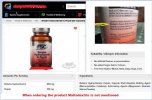That's not how it works, there's a protocol. 1 to 2 capsules a day is the minimum. for low stomach acid That is the starting point. to supplement with
I was down to 8 capsules.
One of the most common methods of supplementing for low stomach acid is using Betaine Hydrochloride (HCL).

healthygut.com
So 8 capsules are likely between 1 and 6 grams of carbs from maltodextrin.
Had you just posted to share your annoyance with 'hidden' ingredients, you'd likely have found most of us heartily agreeing. It is truly frustrating that not all products are obliged to provide nutritional information.
As it is, you chose to add that "A sudden increase in blood glucose in people with insulin resistance or diabetes can be fatal", suggesting this had a relationship with those supplements.
You didn't die from your possible slight increase of bg due to those few added carbs, and you didn't come close to dying from it. What's more, nobody did because the amount ingested is too small. Ergo, it's not fatal.
In regular foods, where an ingredient like maltodextrin can be more substantial than a daily amount of only a couple of grams, there's the nutritional information on the back, nothing hidden about it because it's calculated in the carbs.
You're the one who chose to include the fatal bit, without even adding you were quoting something, so you made it look like you believe the BG-rise from those supplements can be fatal.
So don't be surprised we react to that bold statement, and not to the part where manufacturers don't share information about their products.
A sudden increase in blood glucose in people with insulin resistance or diabetes can be fatal.
And quoted from a source or not, this is not correct.
- A
prolonged rise to very high numbers can be fatal by DKA.
- A
very long term moderate rise can be fatal by various diabetic complications.
-
Thousands of sudden increases in BG can be fatal, again by complications from long standing diabetes.
But a sudden increase, a spike as we know it, is not fatal. Your source is wrong.
A sudden drop can be fatal in those treated with certain medications (most people with insulin resistance or diabetes are not treated by such medications), a sudden rise can not.

healthygut.com


